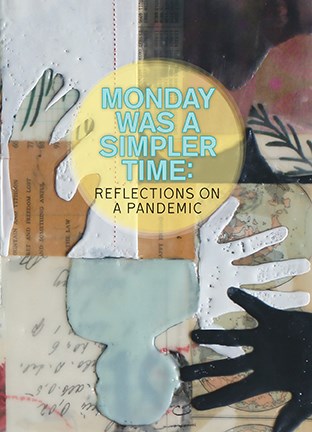One Monday in March of this year Festival of the Written Arts producer Jane Davidson was making travel arrangements for the many Canadian authors who had been invited to the August festival. But by Thursday she was considering cancelling those arrangements because in the interim, the world had changed.
This meteoric change gave rise to possibly the best book title ever: Monday Was a Simpler Time: Reflections on a Pandemic (published by the Festival).
Instead of travelling to Sechelt to speak in front of hundreds of readers, 17 of the writers gave up their stories in prose, poetry and art to an anthology focusing on what life is like for them when all is not normal.
A theme has emerged in this collection – not surprisingly – that of home. Where do we shelter when there’s a pandemic? Home. Where do we work when we can no longer go to the office? Home. And so it is we visit Greenwood author Michael Christie’s hand-built home in the woods and we go winter camping at a cabin in northern Saskatchewan that Harold R. Johnson calls home. We lie back and stare at the cracks in our ceiling with poet and writer Amber Dawn and we feel the claustrophobia of Anni’s cage in Michelle Parise’s story. Trapped in an urban apartment with a teenager and a fiancé, Anni can work from home, but she cannot go out because she is high risk.
Also at risk is the elder, Marie, who has so many memories. In Iona Whishaw’s story of a care home resident, it is Marie who must soothe her caregiver, a front-line worker who has seen too many deaths. Comic book artist Sarah Leavitt gives a poignant tale in words and images of a loved one dying.
COVID-19 is not the star of this anthology. Black lives pushed it from the headlines this year. Why am I still your visible minority? asks Farzana Doctor in poetry. Jack Wang speaks of discrimination against Asians after the mob has heard the words “the China virus.”
You would think there’s not much room for humour and you’d be correct. Yet the comical Bill Richardson manages to make his essay laugh-out-loud funny as he describes handing out masks at a supermarket and wiping down shopping carts. Just another writer with a book tour cancelled and savings dwindling.
No local authors are included in the book, but the publication was undertaken by Coast professionals: copy editor Anna Nobile, cover artist Charly Mithrush and book designer Derek von Essen. As a legacy project copies will be distributed to Coast secondary schools and libraries, the Sunshine Coast Museum & Archives, the Sechelt Archives, public sector funders, literary organizations and media across the country. All proceeds from the sale of this book are going to the festival’s Legacy of Literacy Endowment Fund. The book is sold ($20) at the festival office (5511 Shorncliffe Ave., Sechelt) and at Talewind Books (5494 Trail Ave. in Sechelt).



